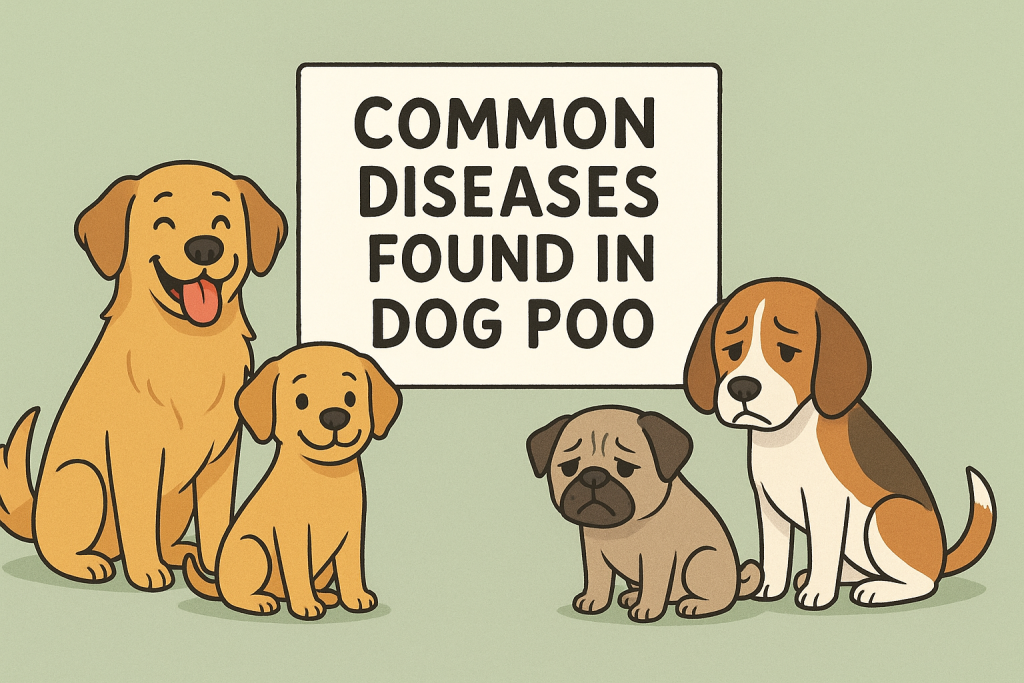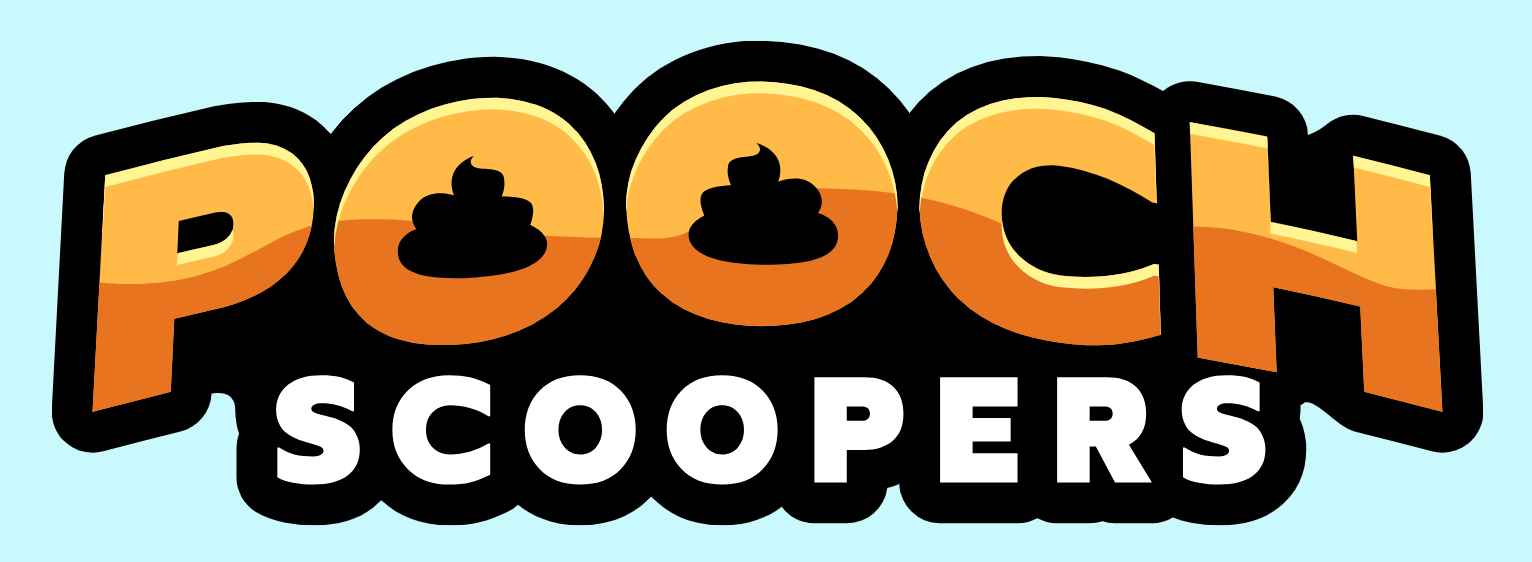Dog ownership comes with lots of love, walks, wagging tails, and, yes, of course, poo. While picking up after your dog might seem like a simple task, skipping it can pose serious health risks to both your pets and other people. Dog waste isn’t just unpleasant… it comes with a lot of common diseases found in dog poo. These can carry harmful bacteria and parasites that spread diseases in your home, garden, and local environment. At Pooch Scoopers, we believe a clean garden is a safe garden. Here’s a closer look at the most common diseases lurking in dog poo, and why regular clean-up matters more than you might think.

Giardia
What it is: Giardia is a microscopic parasite that infects dogs’ intestines and causes a condition known as giardiasis. It is commonly found in contaminated water, soil, or surfaces that have been in contact with infected faeces. Dogs can become infected by drinking from contaminated puddles, licking objects that have been contaminated. Or coming into contact with other infected animals.
Risks to humans: Giardia is transmissible from animals to humans and is especially dangerous to vulnerable groups of people like children, the elderly, or immunocompromised individuals.
In humans, it can cause a range of unpleasant gastrointestinal symptoms, including:
-Persistent diarrhoea
-Abdominal cramps and bloating
-Nausea and vomiting
-Dehydration
-Fatigue and weight loss
How it spreads: The parasite spreads through contact with infected faeces, directly or indirectly. Even tiny, invisible traces of contaminated poop on shoes, grass, or hands can carry the parasite.
Prevention tips:
Always pick up dog poo at home, in public, or on walks.
Avoid letting your dog drink from standing water (like puddles or ponds).
Wash your hands thoroughly after handling your dog, their waste, or anything that may have come into contact with faeces.
Regularly clean and disinfect areas where your dog relieves themselves.
Have your dog’s stool tested by a vet regularly, especially if they show symptoms.
Leptospirosis
What it is: Leptospirosis is a bacterial disease caused by the Leptospira bacteria. And is commonly found in the urine and faeces of infected animals, including dogs, rodents, and wildlife. The bacteria thrive in warm, wet environments such as puddles, stagnant water, moist soil, and muddy areas. Dogs can contract it by sniffing, licking, or wading through contaminated water or soil, and humans can too.
Risks to humans: Leptospirosis is another transmissible disease that can infect animals to humans. The disease can cause a wide range of symptoms. Some of which may resemble the flu at first, but can escalate if untreated.
Human symptoms include:
-High fever
-Chills and muscle aches
-Headaches
-Vomiting or diarrhoea
-Jaundice (yellowing of skin/eyes)
-Abdominal pain
-Kidney or liver damage
-In rare cases, it can lead to meningitis or respiratory distress
How it spreads: Humans can become infected through direct contact with contaminated water or soil. Or by touching surfaces (like garden tools, boots, or pet fur) that have been exposed to infected dog poo. Even small cuts or mucous membranes (eyes, nose, mouth) provide an entry point for the bacteria.
Prevention tips:
-Pick up pet waste promptly, especially after rain, to prevent contamination of wet areas.
-Avoid allowing your dog to swim or drink from stagnant water sources like puddles, ponds, or ditches.
-Clean your garden regularly, especially areas where pets relieve themselves.
-Wear gloves when handling soil or cleaning up dog waste, and wash your hands thoroughly afterwards.
-Talk to your vet about vaccinating your dog against leptospirosis, especially if they’re active outdoors.
Roundworms
What it is: Roundworms are common intestinal parasites in dogs, especially puppies. Adult roundworms live in the intestines and produce thousands of microscopic eggs daily, which are shed in the dog’s faeces. These eggs can persist in the soil for years, remaining infectious to other animals and humans.
Dogs can become infected by ingesting contaminated soil, licking contaminated surfaces, or through their mother’s milk. Humans, especially children who play outdoors, are at risk if they accidentally ingest contaminated soil or dog poo.
Risks to humans: Roundworms are zoonotic parasites. When humans accidentally ingest the eggs, they can hatch into larvae and migrate through the body. Causing visceral larva migrans (VLM) or ocular larva migrans (OLM), serious medical conditions that affect internal organs and sometimes the eyes. VLM may affect the liver, lungs, brain, or other organs, causing fever, fatigue, coughing, or abdominal pain. OLM occurs when larvae travel to the eyes, which can lead to vision loss or permanent blindness.
How it spreads: Roundworm eggs are not infectious when freshly passed. However becomes infectious within 2–4 weeks in the environment. Eggs are sticky and can cling to shoes, toys, paws, or hands. Making playgrounds, gardens, and public parks potential hotspots for transmission.
Prevention tips:
-Deworm your pets regularly, especially puppies, under the guidance of a veterinarian.
-Pick up dog poo, both in your garden and in public areas.
-Keep children away from areas where pets relieve themselves, especially sandboxes or garden beds.
-Wash hands thoroughly after outdoor play, gardening, or pet waste handling.
Keep pets away from eating wild prey or scavenging in waste, as they can pick up roundworms from other animals.
Hookworms
What it is: Hookworms are small but dangerous intestinal parasites that live in the digestive tract of infected dogs. They feed on blood and are shed in the faeces in the form of microscopic eggs. In warm, moist environments like gardens, parks, or damp soil, these eggs hatch into infective larvae that can survive for weeks or even months.
Unlike some parasites, hookworm larvae can penetrate human skin directly, usually through bare feet or hands. This makes contaminated soil particularly risky, especially for children or anyone who spends time gardening or walking barefoot outdoors.
Risks to humans: Hookworms are zoonotic parasites, capable of infecting people and causing a condition known as cutaneous larva migrans (CLM). In more severe or prolonged exposure cases, they may even cause internal symptoms.
Symptoms in humans may include:
-Itchy, red, winding skin rashes, often described as creeping eruptions
-Abdominal discomfort or cramping if the infection becomes internal
-Fatigue and iron-deficiency anaemia due to blood loss (in rare cases)
-Irritation and secondary infections from scratching the rash
How it spreads: Dogs become infected through ingestion or skin contact with contaminated soil or faeces. Humans usually become infected through direct skin contact, especially when walking barefoot or kneeling in contaminated areas. Hookworm larvae can survive in moist soil, sandpits, and lawns for extended periods, particularly during warmer months.
Prevention tips:
-Scoop dog poo, both at home and in public, to prevent larvae from developing in the soil.
-Deworm your pets regularly with vet-recommended treatments.
-Wear gloves when handling dog waste or gardening in areas frequented by pets.
-Avoid walking barefoot in areas where dogs may have defecated, especially on beaches, parks, or your own lawn.
-Educate children to wash their hands after playing outside and to avoid touching unknown dirt or pet waste.
E. coli
What it is:E. coli is a group of bacteria naturally found in the intestines of both humans and animals, including dogs. While many strains are harmless, certain strains, especially E. coli O157:H7. Can be extremely dangerous and are known to cause serious illness in humans. Dog waste can carry and spread harmful strains of E. coli. Especially if the dog is already infected or has come into contact with contaminated environments or raw meat. Once deposited, the bacteria can contaminate soil, water sources, or nearby surfaces. Making it a hidden health hazard in gardens, parks, and public paths.
Risks to humans: Humans can become infected through direct or indirect contact with contaminated faeces, even if it’s no longer visible. Infection risks increase for children, the elderly, and immunocompromised individuals.
Symptoms of E. coli infection include:
-Severe stomach cramps
-Watery or bloody diarrhoea
-Nausea and vomiting
-Fatigue and dehydration
In rare cases, Hemolytic uremic syndrome (HUS), a serious complication that can cause kidney failure, occurs. Contamination doesn’t just stay on the ground; bacteria can be carried on shoes, paws, garden tools, and even by blowflies or rain runoff.
How it spreads:
-Through contact with contaminated soil, lawns, garden produce, water bowls, or hands.
-In shared spaces like dog parks, playgrounds, and communal walking routes.
-On surfaces like decking, patios, or doorsteps where dogs frequently roam.
Prevention tips:
-Pick up dog waste, even in your own garden; leaving it to “decompose naturally” gives harmful bacteria time to spread.
-Never compost dog waste in household compost piles.
-Wash hands thoroughly after any contact with dogs, soil, or outdoor surfaces.
-Clean children’s toys and outdoor furniture regularly if dogs use the area.
-Keep dogs away from eating or sniffing unknown faeces on walks.
Why It Matters
Dog waste might look harmless, but it’s anything but. In fact, it’s classified as an environmental pollutant, on par with harmful substances like oil and toxic chemicals. While this classification comes from the U.S. Environmental Protection Agency, the environmental and public health risks are just as serious here in the UK. Across the UK, dog fouling remains a widespread issue in public spaces. Such as parks, pavements, footpaths, beaches, and even children’s play areas. But the problem doesn’t stop in public. When dog waste is left to sit in private gardens or on residential properties, it can build up and become a significant health and environmental hazard.
🐕Let Pooch Scoopers Do the Dirty Work🐕
We Know… Picking Up Dog Poo Isn’t the Highlight of Your Week
Between work, family, and everything else life throws at you, cleaning up after your dog often falls to the bottom of the to-do list. But leaving waste behind can lead to nasty smells, health risks, and an unsightly garden.
That’s where Pooch Scoopers comes in.
We’re a professional dog waste removal service dedicated to keeping your outdoor spaces clean, hygienic, and worry-free so you can spend more time enjoying your garden and less time dodging landmines.
Whether you have one dog or a whole pack, we’ll handle the mess so you don’t have to lift a finger (or a poo bag).
🐕Book your first visit today and enjoy a cleaner, safer, fresher-smelling garden for your entire family—furry and human alike.🐕
🐶Pooch Scoopers – We scoop the poo so you don’t have to!🐶
Pooch Scoopers is Dorset’s number one poo-scooping service. Click here for a free, quick quote!
